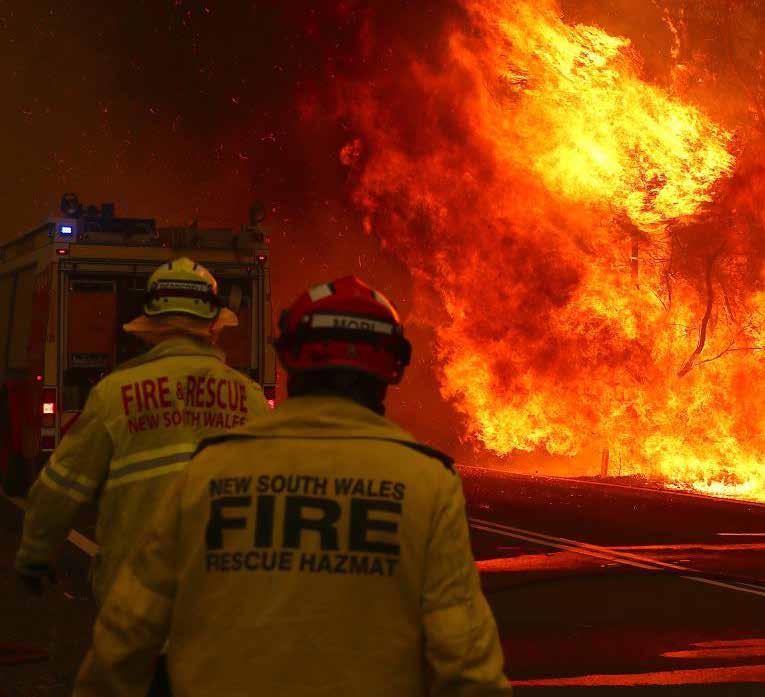
6 minute read
LESSONS FOR PROJECT MANAGERS FROM THE FIRE FRONT
FELLOWS FORUM LESSONS FOR PROJECT MANAGERS FROM THE FIRE FRONT
Source: NSW Fire and Rescue
Fellows have given exceptional contribution to the project management profession. You will hear from one of our Fellows in each magazine edition.
When I was asked to write an article about People that would be relevant to my esteemed project management colleagues my first reaction was: What on earth could I contribute to the discussion that was even the smallest relevance? After the terrible fires we have all witnessed this past few months and spending most of the weekend hoping that my own home would be safe from the southern Canberra bushfires I have had a lot of time to reflect about people – other people and myself. I guess it is fair to say that my reflections drove home a few memories of projects where people issues seemed to arise and became a cause for concern.
LESSON 1
First: let’s cover the obvious – in a crisis we see the best and worst of people. Stress and anxiety can do strange things to people – people who in normal circumstances behave as you would expect but, when the pressure they present behaviours that surprise and sometimes shock all of us.
Technology is easier to predict than people are. In a project we spend countless hours planning to deliver and risk manage our technology. How much thought do we really give to the more complex areas, such as people who are far more difficult to predict and control?
LESSON 2
Second: projects, by their nature can be stressful endeavours – do we really know what this environment can do to the staff involved in these projects? Stress can drive a range of emotions and behaviours, that without careful management can seriously impact your project delivery success. Okay. Some personal reflection time – I know that when I am stressed my ability to regulate my own anxiety and emotions is a challenge – So why would I be any different to anyone else?
Be aware of how stress impacts people in and around your project. Ignoring the impacts to people and hoping they will respond in the way that you want them too is likely to bring you grief. As a leader of projects my own response to stressful situations can have a very real impact on others. Watching the leadership of the fire services I realised how their calm and consistent messaging provided citizens a level of reassurance and leadership that they desperately needed. In difficult situations the calm and controlled approach has a better chance of inspiring confidence and driving the behaviour that you need the most at the time.
LESSON 3
Projects can bring out leadership qualities regardless of any rank or seniority. As an experienced Project Manager, I am regularly surprised by the growth and development in abilities of people. Certainly, I have seen some team members blossom

in the face of project delivery and show great leadership. Leadership can come from the most unexpected places – it isn’t all about fanfare and fame. Again, the fire situation has shown that even the humblest person can lead by example, show great compassion and make a very real difference to those around them. I guess we all like to think that we are ‘leaders’ but can we honestly say that we are all of the time? Leading in the time of crisis versus leading in calm – be aware of how we lead in both situations and think about the impact we have on those that we are leading.
LESSON 4
Next key observation is that projects need people. Again, this might seem obvious but all too often our projects suffer from obtaining and retaining talented team members. Finding the ‘right’ people isn’t an easy task. Not everyone would make a good fire fighter – they have processes and training in place to select people for this important role. Many of my project teams were assembled before I was appointed and assignments are dictated by ‘who is available’, instead of who has the best skills, knowledge and experience to be successful. Imagine if the fire services took this approach? I suspect our fire protection outcomes would be very different. Do what you can to get the best people for your project roles and do not discount the importance of training. This lesson I have to say, can be difficult where you have nearly zero ability to influence team selection. Additionally – once you have the ‘right’ people, retaining them should not be guaranteed. People leave roles/organisations for many reasons. Some you can influence and some you cannot.
LESSON 5 Have a clear retention strategy and think early about fallback plans. Personally, I rely on shadowing from project initiation to reduce the risk of a single point of failure – I always remind people all it takes is for a single person to win Lotto and take off to some lovely island for things to go horribly wrong. After reminding team members of my desire for them not to buy Lotto tickets while the project is delivering – the more sensible side of me kicks in and I make sure that I give equal consideration to retaining people/knowledge as I do to finding the right people in the first place.
When the bush fires are eventually out there is always a period of recovery. Project completion also needs a period of recovery. So many times, I have seen people moved straight from project to project without consideration of the need to debrief and recover before facing the next one. I am not talking about giving everyone a paid holiday (nice thought, but back to reality) but of allowing an opportunity for team members to reflect on the project and themselves before facing the next challenging project delivery. While we pay some lip service to various ceremonies relating to lessons learned it still feels very much like going through the motions and ticking boxes.
LESSON 6 Lessons are best learned with honest reflection and developing and implementing clear remediation actions. Recognising lessons and then failing to implement any remediation is next to useless. Once again timing is key – the time to look at blame, root cause and lessons is not during a crisis but after a period of calm when rational thought can return. While people naturally have a need to resolve/address issues and risk the time in which to do it needs careful consideration.
LESSON 7
Finally, celebrating success is often overlooked and seen as frivolous. While putting out a fire may not feel the same as a successful project – we must consider the amount of lives saved and the number of homes protected in among the heart-breaking losses. Projects are about delivering and supporting organisation change. So, if you want to change your culture and cement change; recognising success and individual performance (even if you have suffered some loss/setbacks) will help you drive a high performing team environment and increase your benefit realisation. Author: Susan Woodcock FAIPM, CPPD, BBus, MPM, MBA, PMIPMP, PMI-RMP, Adv Dip (Public Admin). Susan is a versatile Programme and Project Management Professional with over 30 years delivery experience in large scale business and IT transformation agendas enabling her to add significant value to operations. With highly developed stakeholder interface skills and in-depth knowledge of technical project management disciplines, she has worked extensively in various agencies of the Australian Public Service and for both large and small Australian and Asian business enterprises.










